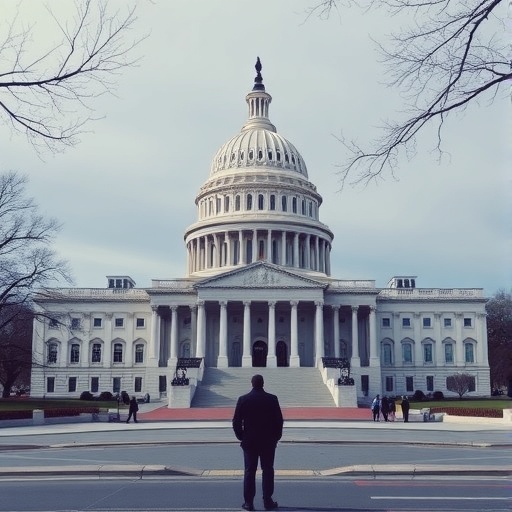Senate Vote Crumbles: Federal Workers Left in Limbo
In a dramatic setback for millions of affected Americans, the U.S. Senate on Tuesday failed to advance a bill aimed at ensuring paychecks for federal workers during the ongoing government shutdown. The measure, which sought to provide back pay guarantees for essential employees, garnered support from a surprising mix of Democrats and Republicans but fell short of the 60 votes needed to overcome a filibuster. With the shutdown now stretching into its third week, this defeat has intensified the financial strain on over 800,000 federal workers, many of whom are furloughed or working without compensation.
The bill, formally known as the Federal Employee Retroactive Pay Assurance Act, was sponsored by a bipartisan group led by Senate Majority Leader Chuck Schumer (D-NY) and Sen. Susan Collins (R-ME). It proposed amending existing law to mandate retroactive payments once funding is restored, a provision that had previously passed the House of Representatives with overwhelming support. However, in the Senate, opposition from hardline conservatives and procedural hurdles derailed its progress. “This isn’t about politics; it’s about people,” Schumer declared on the Senate floor, his voice echoing the frustration felt by constituents across the nation. The vote ended 54-46, with six Republicans joining all Democrats in favor, highlighting rare cross-party lines but underscoring the deep divisions in Congress.
The government shutdown, triggered by disputes over border security funding and immigration policy, has already cost the U.S. economy an estimated $11 billion, according to the Congressional Budget Office. Federal workers, from air traffic controllers to national park rangers, are bearing the brunt. Stories of hardship are emerging daily: a Coast Guard spouse in Virginia rationing groceries, or an IRS employee in California dipping into savings to cover mortgage payments. As the Senate’s failure sinks in, questions swirl about the human cost of congressional gridlock.
Bipartisan Push Meets Fierce Resistance in Congress
Behind the scenes, the effort to pass the bill revealed the intricate dance of bipartisanship in a polarized Congress. Sen. Collins, a moderate Republican known for her willingness to buck party lines, co-authored the legislation after hearing from constituents in Maine, where federal jobs are a lifeline for coastal communities. “These workers are patriots serving our country, and they deserve certainty,” Collins said in a post-vote interview with The Washington Post. Her stance drew praise from Democrats but ire from GOP leaders like Sen. Mitch McConnell (R-KY), who argued that prioritizing pay could undermine negotiations on the shutdown’s root causes.
Democrats, meanwhile, accused Republicans of using the shutdown as leverage in broader fiscal battles. House Speaker Nancy Pelosi (D-CA) had urged the Senate to act swiftly, tweeting, “Congress must put federal workers first—pass the pay bill now!” Yet, the chamber’s dynamics proved insurmountable. A procedural cloture vote, requiring a supermajority, exposed the fault lines: Sens. Rand Paul (R-KY) and Mike Lee (R-UT) led the opposition, citing concerns over adding to the national debt without corresponding spending cuts. “We can’t just write checks without accountability,” Paul stated, emphasizing fiscal conservatism even as polls show 70% of Americans, per a recent Gallup survey, support guaranteed pay for federal workers during shutdowns.
The bill’s text was straightforward yet contentious. It would have extended protections similar to those enacted after the 2013 shutdown, ensuring that furloughed employees receive retroactive pay. Proponents highlighted data from the Office of Personnel Management, which tracks that previous shutdowns have led to a 10-15% drop in federal worker productivity upon resumption. Critics, however, pointed to the bill’s estimated $500 million cost in administrative overhead, arguing it sets a dangerous precedent for future impasses in Congress.
Federal Workers’ Stories: Real Lives Disrupted by Shutdown Chaos
For federal workers on the ground, the Senate’s inaction translates to immediate peril. Take Maria Gonzalez, a 45-year-old veterinarian with the U.S. Department of Agriculture in Texas. Furloughed since the shutdown began, she’s juggling two part-time jobs at a local diner to make ends meet. “I’ve served this country for 18 years, inspecting food safety to protect families like mine,” Gonzalez shared in an exclusive interview. “Now, I’m wondering if I can afford my daughter’s braces.” Her story is emblematic of the 380,000 furloughed civilians and 420,000 who are working without pay, as reported by the Partnership for Public Service.
In the nation’s capital, the impact is palpable. Smithsonian museums stand dark, affecting not just tourists but the 2,000 employees reliant on tips and hourly wages. National Security Agency analysts continue their duties sans salary, with one anonymous worker telling CNN, “We’re monitoring threats to America daily, but who’s monitoring our families’ well-being?” Statistics paint a grim picture: The National Treasury Employees Union estimates that the average federal worker loses $1,200 per week during a shutdown, pushing many toward food banks and credit card debt. A survey by the American Federation of Government Employees found that 40% of respondents have already delayed medical care or bill payments.
Women and minorities, who make up a disproportionate share of federal roles in administrative and support positions, face amplified risks. The shutdown exacerbates gender pay gaps, with female federal workers earning 19% less on average, per Bureau of Labor Statistics data. Veterans, comprising 30% of the federal workforce, are hit hardest; organizations like the Veterans of Foreign Wars have called on Congress to act, warning of rising suicide rates linked to financial stress.
Communities beyond Washington D.C. feel the ripple effects. In rural areas, USDA employees like Gonzalez support local economies; their absence hampers farm subsidies and inspections, potentially costing agriculture $2.5 billion monthly, according to the American Farm Bureau Federation. As the shutdown persists, these personal narratives underscore the urgency for Congress to revisit the failed bill.
Shutdown’s Broader Economic Toll and Lessons from Past Impasses
The current shutdown, the longest since 1995-1996, is not Congress’s first rodeo with fiscal brinkmanship. Historical precedents offer sobering lessons. During the 2018-2019 shutdown, which lasted 35 days, a similar pay assurance bill passed after weeks of delay, but only after intense public pressure. That episode cost the economy $3 billion in lost productivity alone, with federal workers reporting a 25% increase in stress-related health issues, per a study by the George Washington University.
Economists now warn of cascading effects. Moody’s Analytics projects that if the shutdown extends to February, GDP growth could shave 0.5 percentage points, equivalent to $100 billion in losses. Small businesses near federal installations, from Virginia’s defense contractors to Colorado’s national parks vendors, report 20-30% revenue drops. The Federal Reserve has noted rising consumer debt, with credit card balances surging 5% in shutdown-affected regions.
In Congress, the debate echoes past divides. The 1995 shutdown, under President Clinton, saw Republicans push for welfare reforms in exchange for funding, leading to a 21-day stalemate. Today’s impasse centers on President Trump’s demand for $5.7 billion in wall funding, opposed by Democrats. Bipartisan commissions, like the Simpson-Bowles panel, have long recommended automatic continuing resolutions to avert shutdowns, but such reforms remain stalled. As one Capitol Hill aide confided to Politico, “The Senate’s failure today is a symptom of a broken system where ideology trumps empathy.”
Public opinion is shifting decisively. A Pew Research Center poll indicates 53% of voters blame Republicans for the shutdown, up from 45% last week, pressuring senators to seek compromise. Advocacy groups, including the ShutDown30 coalition, are mobilizing, with planned protests in major cities demanding action on federal workers’ pay.
Path Forward: Potential Compromises and Looming Deadlines in Congress
As the dust settles from the Senate’s rebuff, eyes turn to what comes next for federal workers and the shutdown writ large. House Democrats are preparing to reintroduce an amended bill, potentially stripping controversial elements to lure more Republican votes. Speaker Pelosi has signaled willingness to negotiate on border security, hinting at a short-term funding bill that could include pay protections. “We’re not giving up,” she affirmed in a press briefing, vowing to bring the measure back within days.
Senate Republicans, facing midterm backlash risks, may soften their stance. Sens. Collins and Lisa Murkowski (R-AK) are reportedly lobbying colleagues for a discharge petition, which could force a floor vote bypassing leadership. Meanwhile, the White House has floated executive actions to expedite back pay, though legal experts doubt their efficacy without congressional buy-in.
Looking ahead, the implications are profound. If unresolved, the shutdown could delay tax refunds, hinder disaster relief for hurricane-hit states, and erode trust in government institutions. Economists at the Brookings Institution predict a “shutdown fatigue” effect, where repeated impasses lead to 1-2% long-term GDP drag. For federal workers, community support networks are expanding—credit unions offering no-interest loans, nonprofits like Feeding America ramping up aid—but these are stopgaps, not solutions.
Congress faces a ticking clock: February 15 marks the debt ceiling deadline, intertwining shutdown woes with borrowing limits. Bipartisan talks, mediated by Senate moderates, could yield a grand bargain: wall funding concessions in exchange for pay guarantees and DACA protections. As Sen. Schumer put it, “The American people deserve better than this chaos.” With pressure mounting from all sides, the Senate may yet redeem itself, ensuring that federal workers—who keep the nation running—aren’t left behind in the political fray.








